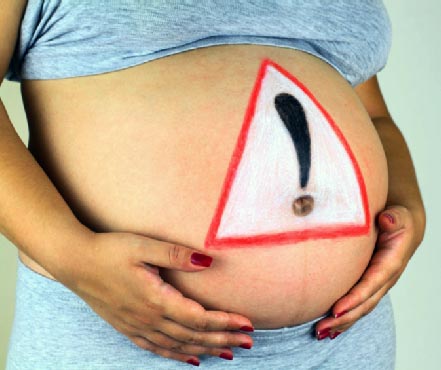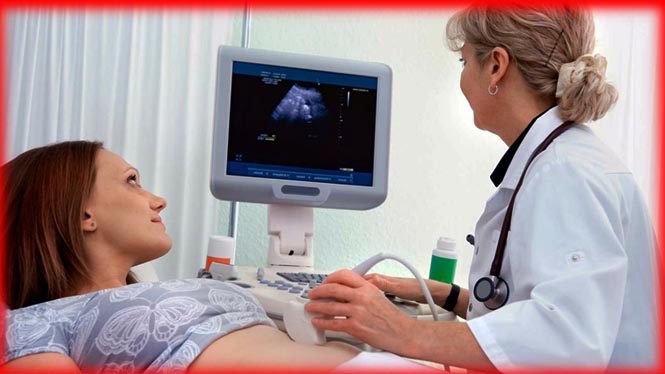Overview
High risk pregnancy describes pregnancy with significant risks to the health of both mother and child. These risks can be caused by certain conditions as well as factors such as age, being pregnant with more than a single baby or a history of prior problem pregnancies.
Risk Factors
 Maternal age (young or old), problems with previous pregnancies, being overweight or underweight and pre-existing health conditions can contribute to a high risk pregnancy.
Maternal age (young or old), problems with previous pregnancies, being overweight or underweight and pre-existing health conditions can contribute to a high risk pregnancy.
Pre-Existing Conditions
Certain conditions that are present in the mother before pregnancy, such as cancer, heart disease, high blood pressure, autoimmune disorders, kidney problems and diabetes, can potentially complicate a pregnancy.
Conditions During Pregnancy
Some conditions that pose a health risk can develop during pregnancy. These conditions include gestational diabetes, preterm labor and eclampsia.
Preparing for Pregnancy
The National Institute of Child Health and Human Development (NICHD) recommends seeing your doctor before getting pregnant to be sure you are in good preconception health.
Reducing Risks While Pregnant
According to the NICHD, pregnant women should get at least 400 micrograms of folic acid every day, follow a healthy lifestyle, get proper immunizations and start prenatal care visits early in the pregnancy. Consider prenatal testing to identify any possible problems with the baby’s health.
Psychosocial High Risk Pregnancy
Risky Behaviors
Pregnant women who engage in unhealthy social behaviors, such as smoking cigarettes, drinking alcohol and using drugs, are classified as high risk because these practices can lead to high blood pressure, premature labor and even still birth.
Addictions
Addictions to drugs and alcohol can cause severe complications during pregnancy, including birth defects in the unborn child, such as fetal alcohol syndrome.
Mood Disorders
Mood disorders, such as anxiety and depression, are quite common during pregnancy and can lead to lack of self-care and even suicide. According to the American Pregnancy Association, 10 to 20 percent of pregnant women suffer depression during their pregnancies.
Psychotic Illnesses
More severe psychological conditions, such as schizophrenia, can cause particularly troublesome complications during pregnancy. “Women with schizophrenia tend to receive less prenatal care, have poorer nutrition, and use more tobacco, alcohol and illicit drugs compared to women without schizophrenia.” This is according to a study published in a 2006 issue of the American Journal of Psychiatry.
Intimate Partner Violence
The Centers for Disease Control and Prevention associates acts of domestic violence committed against pregnant women with higher rates of delayed prenatal care, tobacco use, and drug and alcohol abuse.
Possible Solutions
Managing the psychosocial factors that cause high risk pregnancies is difficult. Cultural differences and individual freedoms must be taken into consideration, along with fetal rights, in order to ensure a healthy outcome for mother and baby.
High Risk Pregnancy Conditions
A high risk pregnancy occurs when a condition makes you and your baby more likely to experience serious problems during gestation. Although certain factors increase your likelihood of developing a high risk pregnancy, you can take measures to minimize some of your risk, in certain situations.
Effects
A high risk pregnancy typically involves a greater chance of developing serious pregnancy complications, and an increased risk of sickness or mortality for the mother or baby.
Medical History
Certain chronic health conditions that you have before conceiving can make you more likely to experience high risk pregnancy complications. These conditions include kidney problems, heart disease, diabetes and cancer, according to the National Institutes of Health (NIH).
Conditions That Develop
Non-pregnancy related health conditions that develop during gestation can also make a pregnancy high risk; examples include conditions that cause a high fever or serious infections, and those that require abdominal surgery, according to the Merck Medical Manual.
Pregnancy Complications
Some serious disorders that occur during gestation as a result of pregnancy (pregnancy complications) are considered high risk pregnancy conditions, including preeclampsia, gestational diabetes and preterm labor (labor before 37 weeks of pregnancy).
Risk Factors
According to the National Institute of Child Health and Human Development, certain risk factors make you more likely to experience a high risk pregnancy condition, including your age (very young or old), your weight (underweight or overweight), and a history of problems in previous pregnancies.
Prevention/Solution
In order to minimize your chances of developing high risk pregnancy complications, be sure to take a daily prenatal vitamin if you may become pregnant, the National Institute of Child Health and Human Development recommends eating a healthy diet and avoiding cigarette smoke, alcohol and drugs.




